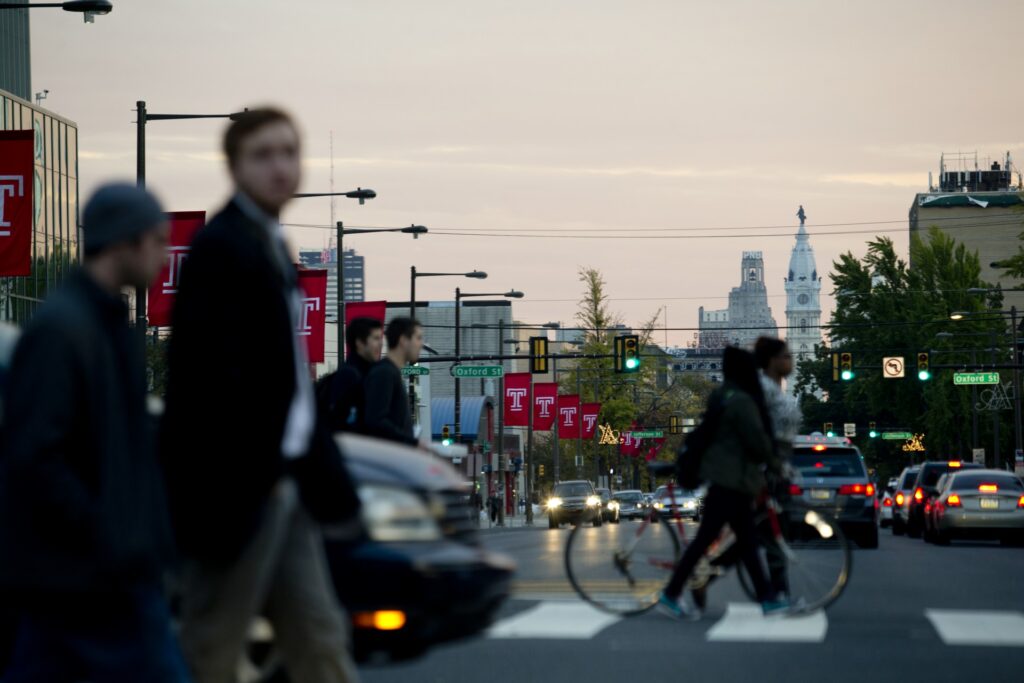Four members of Philadelphia’s new Commission on LGBT Affairs are graduates of Temple Law School – and two are currently members of the faculty. Professor Leonore Carpenter LAW ’00, Visiting Assistant Clinical Professor R. Barrett Marshall LAW ’11, Amanda Dougherty LAW ’11, and Kae Greenberg LAW ’11 have all been appointed to the Commission. Professors Carpenter and Marshall weighed in on why they joined the Commission and their hopes for what the Commission will do.
TLS: First, why did you decide to apply and what do you want to see the Commission accomplish?
Professor Carpenter: I decided to apply to the Commission because I saw it as a unique opportunity to collaborate with other advocates on issues that affect Philadelphia’s LGBTQ community. As a person who’s worked in LGBTQ advocacy in this city and state for quite a while, I’ve seen the power of collaboration. When we work together, each bringing a different but equally valuable perspective and skill set to the table, we do a better job of making our community a safe, healthy, and welcoming place for LGBTQ people. I hope that the Commission can work with the Director of the LGBT Affairs Office and the rest of City government to examine, on a broad policy level, the ways in which LGBTQ communities – particularly communities that are multiply marginalized – can be better served by City government.
Professor Marshall: I wasn’t sure if I wanted to apply at first because many of the issues facing the LGBTQ community in Philadelphia right now are specific to racism and it’s most important that we prioritize the voices of people of color in those conversations. I still absolutely feel that way, but I also believe that as a non-binary person and a civil rights attorney I do have a unique perspective that I think will be valuable to the Commission. I hope the Commission works to keep the LGBTQ community connected to their city government. I think there is an opportunity for this Commission to set a clear agenda based on the community’s needs and to provide priority for the needs of the most vulnerable in our community. It is my understanding that we will be working closely with the Director of LGBT Affairs, Amber Hikes, and supporting her on initiatives affecting the community throughout Philadelphia. I think this is a great opportunity to elevate voices that have previously not been heard in government.
TLS: Second, what do you think are some of the most pressing issues facing the LGBTQIA communities in Philadelphia?
Professor Carpenter: Philadelphia’s LGBTQ communities are diverse, vibrant, and engaged. But many among us still face significant challenges. For example, homelessness among LGBTQ-identified youth is astronomically high. Many within our communities do not enjoy relationships of trust with local law enforcement. Discrimination against LGBTQ people continues to contribute to instability in housing and employment. Many within LGBTQ communities are parents, and are directly impacted by the dramatic underfunding of our City’s public schools. Low-income LGBTQ people present unique and sometimes complex legal issues, but there is insufficient access to low-or-no-cost legal services. These are issues that are both pressing to the communities the Commission seeks to serve, and directly interface with aspects of City government. There are many, many examples such as these – that’s why I think the creation of the Commission is so important, and why I’m so excited and honored to be a part of it.
Professor Marshall: I think the greatest issue facing the LGBTQ community is our ability to understand community members from an intersectional perspective. We must develop a functional approach to LGBTQ identities that is inclusive of the experiences of people of color, low income people, people with disabilities, and other people with identities that make them more vulnerable to oppression. This wider issue expresses itself in many specific areas such as housing, healthcare, discrimination in employment, youth homelessness, and more. I think truly adopting an intersectional understanding and approach will be our first step toward addressing these disparities.
Interim Dean Greg Mandel, in extending his congratulations and gratitude to Professors Carpenter and Marshall, remarked that, “The Mayor is figuring out what we already knew—we have a wonderful and active faculty.”

